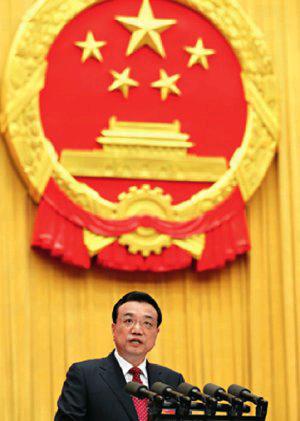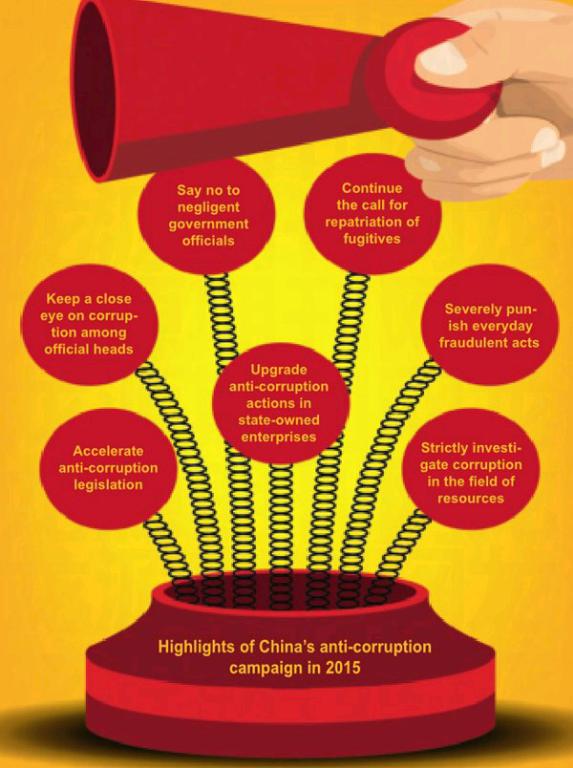Fighting Corruption via a Sound Institutional Mechanism
By+staff+reporter+LI+YUAN
IN a government work report presented at the Third Session of the 12th National Peoples Congress (NPC) Chinese Premier Li Keqiang declared, “We will shed powers to make the government cleaner…our tough stance on corruption is here to stay; our tolerance for corruption is zero.” This mantra is Chinas “new normal” in the war on corruption. Fighting corruption not only gives China a handle on the construction of a clean government, but lends it strong impetus for the rule of law.
A Fruitful Campaign
The past year has seen several “tigers”ensnared in the anti-graft web. On June 14, 2014 Su Rong, vice chairman of the 12th Chinese Peoples Political Consultative Conference (CPPCC) National Committee, was probed for suspected“serious disciplinary and law violations.”Two weeks later Xu Caihou, former vice chairman of Chinas Central Military Commission, was expelled from the Party for bribery and referred to prosecutors. On December 5, Zhou Yongkang, a former member of the Standing Committee of the Political Bureau of the Communist Party of China (CPC) Central Committee (topmost in the ruling party hierarchy), was expelled from the Party and referred to prosecutors. On December 22, another senior official and national political adviser, Ling Jihua, came under investigation for suspected serious disciplinary violations.
More corruption cases have been exposed at the grass-roots level of the government. A total of 637 venal local officials were deposed in 31 provinces throughout China in 2014. Meanwhile, the anti-corruption inspection teams sent out by local governments collected 1,709 tip-offs concerning malfeasance by officials at director general level, and 5,570 complaints about officials at the level of division director.
These decisive anti-corruption measures have improved the governments work style and boosted public morale. According to a survey by the Canton Public Opinion Research Center of 27 provincial capitals and municipalities directly under the central government, almost 80 percent of respondents admitted that the trend of extravagance had been muted, and close to 70 percent noticed a decrease in expensive banquets and luxury gifts. A public servant said: “With fewer official receptions to attend, I can be more committed to work and spend more time with my family.”He acknowledged that he used to worry about offending people if he rejected their dinner invitations or gifts. Melissa Conley Tyler, national executive director of the Australian Institute of International Affairs, believes that China now faces the pressing task of avoiding the middle-income trap. To do so it needs a well-established governing system and laws. In this sense, fighting corruption is of great significance.endprint
Institutional Improvement
Corruption is the scourge of all countries. So far more than 30 countries have formulated over 100 laws and acts specifically on preventing and punishing corrupt deeds. “Corrupt activities worldwide have certain similarities. The anti-corruption lawmaking drives by different countries, therefore, always offer something to be drawn upon by others, as there are certain universal rules that all must respect and observe. Learning from others can help China accelerate its lawmaking in this field,” said Li Shaoping, vice president of the Supreme Peoples Court. “China should accelerate legislation to enhance institution building to uproot corruption, addressing the underlying cause instead of effecting a temporary cure,” he added.
Advocacy of anti-corruption legislation has been in place since the end of the last century. In 1999 the then president of the Shanghai Academy of Social Sciences Zhang Zhongli submitted a proposal to the National Peoples Congress, urging the state to promulgate an anti-corruption law. It was the first proposal of its kind to Chinas top legislature. “Many countries have specific laws on corruption, but in China the only regulations in this regard are the provisions in the Criminal Law that cover embezzlement, bribery and dereliction of duty,” Zhang said. For decades Chinas anti-corruption efforts were guided by government writs instead of national laws.
The situation is changing. In 2013 the NPC revealed a timetable of anticorruption legislation. In 2014 the CPC, Chinas ruling party, laid out explicit requirements on improving the states legislation on corruption. In 2015 the NPC Standing Committee listed the work a priority for this year. “A better institutional mechanism can bolster the anticorruption mission,” Li Shaoping said.
Li observed that the intensifying efforts by the central authority to combat corruption since the 18th National Congress of the CPC have been fruitful, constituting effective deterrence for venal officials. Meanwhile, judicial administrations and other government agencies have rolled out a number of measures to improve the anti-corruption institutional mechanism, which ensure officials are not able to and dare not become corrupt.
International Collaboration
The growing trend of economic globalization and regional integration pose new challenges to the mission of eradicating corruption. With cross-border money transfers easier than ever, some suspects sneak ill-gotten funds abroad via money laundering or foreign investment, making investigations more demanding and expensive.endprint
Since the 1990s some 18,000 corrupt Chinese officials have fled abroad, with at least 500 leaving the country in 2013 alone. Starting in 2008, more than 730 suspects of serious economic crimes were arrested and extradited back to China from 54 foreign countries and regions. Poor cross-border collaboration in law enforcement has always been a hindrance for the global war on corruption.
Last November APEC leaders adopted the Beijing Declaration on Fighting Corruption. In this document members pledge to eliminate corruption through extradition and judicial assistance, and adopt more flexible measures to recover the proceeds of corruption within the law of the APEC economies. In addition to articulating the resolve of members of the organization, the Beijing Declaration also prescribes specific measures to jointly deal with corruption.
Last December at its 12th meeting, convened in Beijing, the China-U.S. Joint Liaison Group on Law Enforcement Cooperation (JLG) reached an important consensus on the two countriescooperation on tracking down venal officials at large and their illegal proceeds. Established in 1998, the JLG is a major mechanism and platform for the two sides to coordinate and communicate on law enforcement cooperation, particularly in fighting corruption. The U.S. is the top destination for Chinas known corrupt officials who have fled the country. But there is no extradition pact between the two countries so far. In its place, however, are several bilateral anticorruption cooperative mechanisms.
Andy Sun, executive director of Asia Pacific Legal Institute, wrote in an article: “Helping China bring corrupt officials and economic fugitives to justice is a moral responsibility, but it also serves the U.S.s national interest…In addition, effective U.S. engagement in this field will help the United States win the hearts and minds of 1.3 billion Chinese people, which can be instrumental for a sound and stable U.S.-China relationship.”
At a press conference during the Third Session of the 12th NPC Chinas Foreign Minister Wang Yi told the media that China carried out a campaign codenamed “Operation Fox Hunt” last year to “bring back fugitives and uphold the sanctity of laws and social justice.” “Also last year, we wrapped up 11 extradition treaties and treaties on judicial mutual assistance in criminal matters, bringing the total number of agreements concluded of this kind to 91. This means that we now have such treaties with countries on every continent.” He added that China will conclude further contracts with more countries.
“Anti-corruption is a never-ending struggle and we will never relent in our effort to bring back fugitives and recover their criminal assets. The Chinese Foreign Ministry will strengthen communication and coordination with other countries and cast a wider and tighter net of international anti-corruption cooperation, so that even the most cunning fox will have nowhere to run to or hide,”the minister concluded.endprint

